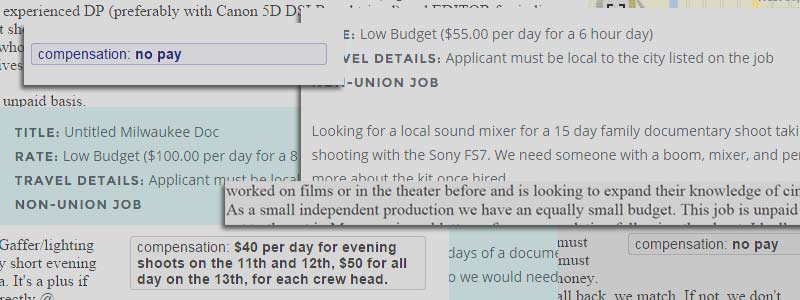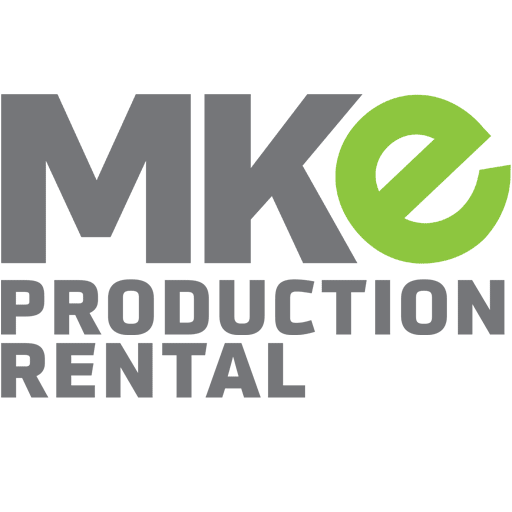 The best part about a career in film, video, or television production isn’t the pay. We have a great job that makes other people jealous. Many of us get to travel, work with celebrities, and have our work seen by thousands or even millions. We get to express our creativity, and when we’re done, the things we’ve worked on can make an audience feel something. That’s a perk that doesn’t come with every job.
The best part about a career in film, video, or television production isn’t the pay. We have a great job that makes other people jealous. Many of us get to travel, work with celebrities, and have our work seen by thousands or even millions. We get to express our creativity, and when we’re done, the things we’ve worked on can make an audience feel something. That’s a perk that doesn’t come with every job.
Something you can get from just any job? A paycheck. We’re paid for our work because, well, it’s work! We get paid to think, to decide, to plan, to anticipate problems and solve them. We’re paid for the skills we bring and the knowledge we’ve already earned. Production assistants, grips, gaffers, camera crew, and production support crew are paid because they are literally carrying the weight of the production. Those camera carts won’t roll themselves! Each of us has only so many shoots in us, before our knees, or hips, or back decides for us it’s time to retire. We’re earning our paychecks to help make that day a little easier.
We are paid because what we’re working on has value. The video we make is important to someone, or we wouldn’t be making it. By the time a production crew shows up, there have been many hours invested in even the smallest project. Meetings with clients, or financial backers, or stakeholders; debates about the script and talent and shooting locations; these decisions were made because someone cared about the project, enough to invest real time and probably real money into it.
As freelancers, we’re paid more than hourly employees. That’s because we spend time hustling to find our next gig. We invoice our clients, run a collections department, and keep our own books. We pay extra social security taxes and file four times a year. We pay membership fees to job-finding websites, we pay for directory listings, we pay professional dues. If we have equipment, we pay for insurance. We pay for a phone, even when it’s not ringing. Nobody is paying those expenses for us.
We don’t get health insurance, time off, or personal days. There is no 401(k). If we’re injured at work, we might not be covered under workers’ compensation. When the winter comes around and we have no work, there is no unemployment check. When a company that owes us money files for bankruptcy, our wages aren’t protected. We’re not hourly employees, and that’s just fine. It just means that we shouldn’t be paid like hourly employees, either.
On the days we aren’t working, we’re still working. We’re putting our most recent work online, updating our websites, creating online profiles, and shmoozing with production companies and rental houses to stay at the top of the list of hires. We’re shipping disk drives from past shoots by FedEx, and on the phone with producers talking about projects that will never happen. We answer the phone and emails on Saturday and Sunday, because we know waiting until Monday means someone else already got the gig. We work on East Coast time and West Coast time in the same day. If you call me in the shower, I answer your call before I even dry off. That’s the life of freelance crew.
When a client asks us to bring equipment, it arrives on time in good condition. Our cameras get older every day. Your microphone, your lenses, your cables and tools and every little thing you use to do your job gets a little more worn out. Grips and ACs show up with a belt full of tools. PAs drive thousands of miles each day. If you’re not charging for your equipment or the miles on your car, you’re giving someone free stuff. It’s not a loan, because if it breaks, your client isn’t going to offer to pay for it. You’re providing equipment as a service. You have the right to charge for that service.
There are some simple ways to get an idea of what your day rate should be. Some people say that 2.5 to 3 times what a comparable hourly employee would charge is a good starting point. That would put “minimum wage” for crew around $145 for an eight-hour day. I like to charge a day rate that’s about 1/120 of what I’d like to earn in a year, so that I can aim to get paid to work 120 days, work another 120 days unpaid running and building my business, and enjoy some time off in the slow season. Some years will have more paid days, and some less. Some gigs you’ll charge more because you know the client will be difficult, and some gigs you’ll charge less because they work around your schedule, pay on time, and are generally nice people. Whatever you charge, make sure there’s enough not just for today, but for the work it took to get you the gig, and the work it will take you after the gig is “finished,” but before you get paid.
There are many, many things that are more important than money. I can assure you, however, screen credit is not one of them. I can’t print out my IMDb page and use it to pay my rent. Credit is something that is assumed, where appropriate. It is not something that is offered in exchange for work. If you want a lot of credits, change your name to Alan Smithee. If you want a successful career in film and video production, don’t apply for a gig where “credit” is listed as a perk.

There are SO MANY GIGS out there that offer $100 or less a day. Usually, they say things like “expand your knowledge” and “network” and all the other perks that literally every production gig ever can do for you. They will offer you credit, or letters of reference. They will tell you that they will pay you more when the show gets picked up, or gets advertisers, or maybe even let you in on a share of the profits. I assure you, there will never be any profits. If these people knew how to make profits, they would be paying people more than $100 a day.
If you are capable of standing, walking, and breathing, you are worth more than $100 a day. If you can tell the difference between a camera and an actor, you’re worth more than $100 a day. If you can simply show up on time, at the right place, with pants on, you are worth more than $100 a day. There is no exception to this.
There are things we all do for free. I help my friends move for free. I mow my parents’ lawn for free. From time to time, I even help friends or nonprofits make a video for free. That’s because my friends understand the value of my time. Nonprofits understand that the spirit of volunteerism comes from shared values, not a desire for meals and credit. Free is a fair price for working with someone, not for someone.

I’m offering a challenge to all the film and video freelancers out there. Make your bottom, lowest, will-not-negotiate-lower-than-this day rate more than $100. Let those gigs that pay $100 go to someone else. Let the thrifty producers and ultra-low-budget filmmakers get the production they deserve. Let them hire unreliable people: the unprofessional, the underequipped, and the underprepared. Let them hire students without experience, and people without equipment. Let them find out what $100 buys. Give yourself the day off, because your time is worth more. Give yourself the day off, because the underpaid crew is not going respect you or their work. Give yourself the day off, because maybe the next time that producer needs to hire, it will be at a fair wage.
Posted by Jon Kline



